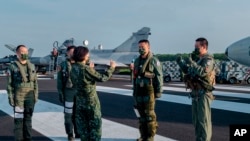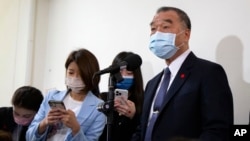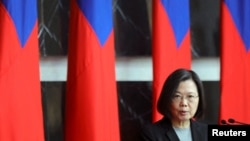Russia’s invasion of Ukraine has brought renewed attention to whether Taiwan’s civilian population would be ready to defend the island democracy if it ever faced an invading force from China.
Taiwan has a complicated relationship with its military and conscription, due to its lingering associations as enforcers during the island’s four-decade martial law era that ended in 1987.
Since taking office in 2016, Taiwan’s President Tsai Ing-wen has focused heavily on improving the image and prestige of the military. She has also made defense a key focus of her administration, with policies of reviewing reserves and improving the quality of the professional military.
Most Taiwanese men are required to complete military service, learning basic defense skills with the aim of being able to assist Taiwan’s professional military in the event of a war. The government has gradually reduced its military service requirement from two years to four months since the 1990s, but the Ministry of Defense has said that such a short training period may not be enough.
Women are not required to undergo the same training, although about 15% of the islands professional military is female.
Male citizens also have the option of serving alternative service which is community service organized through the Ministry of the Interior.
Defense Minister Chiu Kuo-cheng told reporters in late March that he would put forward a plan by the end of the year to bolster Taiwan’s defenses, which could include extending national service.
It’s not uncommon in Taiwan to hear the current four-month military system described by young men as a kind of “summer camp” experience, and some citizens think that four months is too short to learn important skills.
Recent polling by the Taiwan Public Opinion Foundation found that 78% of respondents aged 20 and older had “no confidence at all that Taiwan could defend itself.” Another 75.9% of respondents aged 20 and over said they would support extending military service from four months to one year.
Kharis Templeman, a research fellow at the Hoover Institution and part of the Project on Taiwan in the Indo-Pacific said discussing the length of service was a “step [in] the right direction.”
“There’s the symbolic signaling power of having your entire adult population potentially go through military service as a signal of a willingness to sacrifice and commit to Taiwan’s own defense,” he said.
Templeman said Taiwan’s ability and commitment to defend itself has been questioned in both Beijing and Washington and improving mandatory military service would send a clear signal to both that it is prepared.
A second outcome from lengthening military service, Templeman said, is that it could give Taiwan’s military a chance to review its reserve system.
Many analysts say it would be helpful if they were recalled as units and not as individuals, functioning like the U.S. National Guard. Male citizens are currently called up at random to review their training which makes it more difficult to maintain comradery.
Some key changes, however, have already been made. The government is now testing a pilot plan to recall reservists for two stints of 14 days, up from a week or less to ensure that there is adequate time to review skills.
Outside of formal training, however, most citizens have few opportunities to practice skills. Civilian gun ownership is restricted in Taiwan to fishermen and indigenous hunters, which means that most civilians cannot practice marksmanship in their spare time.
Lo Chih-cheng, a legislator from the Democratic People’s Party who sits on the Foreign Affairs and National Defense Committee, said the war in Ukraine has generated renewed discussion around the need for a “civilian defense force” or an “all-out defense force” that is separate from the military but capable of engaging in irregular warfare.
“The current system of four months training, obviously, is too short to train people well prepared for that kind of urban warfare, so it’s been discussed widely that maybe we need to extend the duration of our military training for young people,” Lo told VOA.
For now, the discussion is academic, but several civilian groups have emerged like Forward Alliance, which trains civilians in skills such as first aid and emergency response, and the Taiwan Military and Police Tactics Research and Development Association, to help with other defense skills.
Lo also said a return to full year of service is unlikely due to the economic impact. Taiwan has a declining population and removing young men from the workforce could have a far larger impact than in decades past when Taiwan had a higher birth rate.
Ivan Kanapathy, a senior fellow at the Center for Strategic and Budgetary Assessments in the U.S., said that length of time spent in military service is not necessarily as important as the quality of training.
“The reduction of Taiwanese conscription from 2 years to 4 months was fueled by popular recognition that conscripts were used for mundane manual labor and administrative duties rather than training for combat,” he said by email. “Taiwan would have to allocate significantly more resources to live fire and tactical training if it were to reverse course.”
Analysts like Kanapathy and Templeman said Taiwan has other challenges it needs to face beyond military service. The war in Ukraine has shown the importance of stocking up on munitions, said Templeman, and the importance of new tech like unmanned aerial vehicles.
Both also expressed concern about the direction of Taiwan’s overall defense policy, which would dictate how everything from reserve soldiers to weapons should be utilized.
In recent years, Taiwan has pursued a strategy of “asymmetric warfare” to counter the threat from China, but since the retirement of Chief of General Staff Lee Hsi-ming, Taiwan’s policy is now less clear, they both said.






